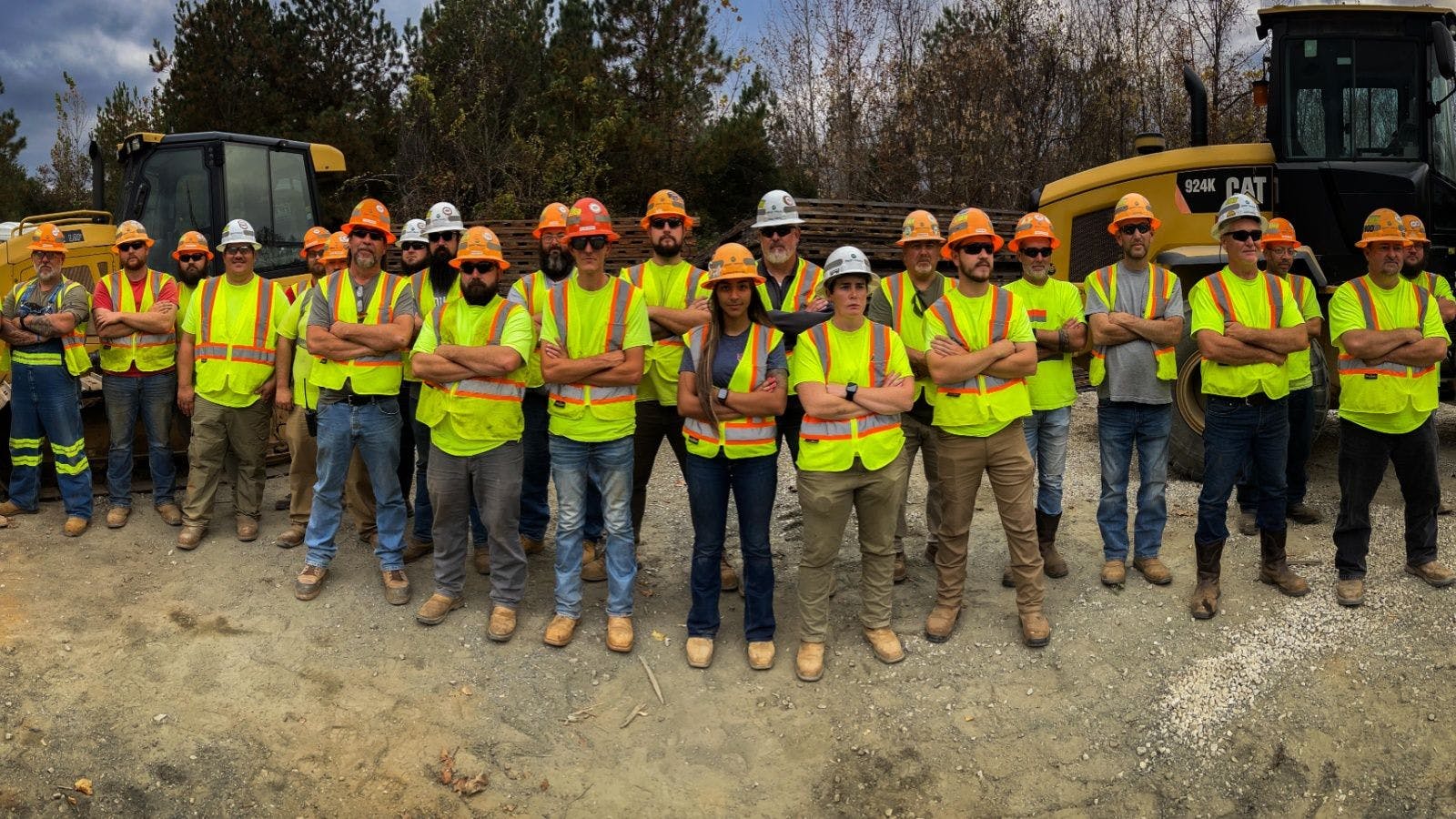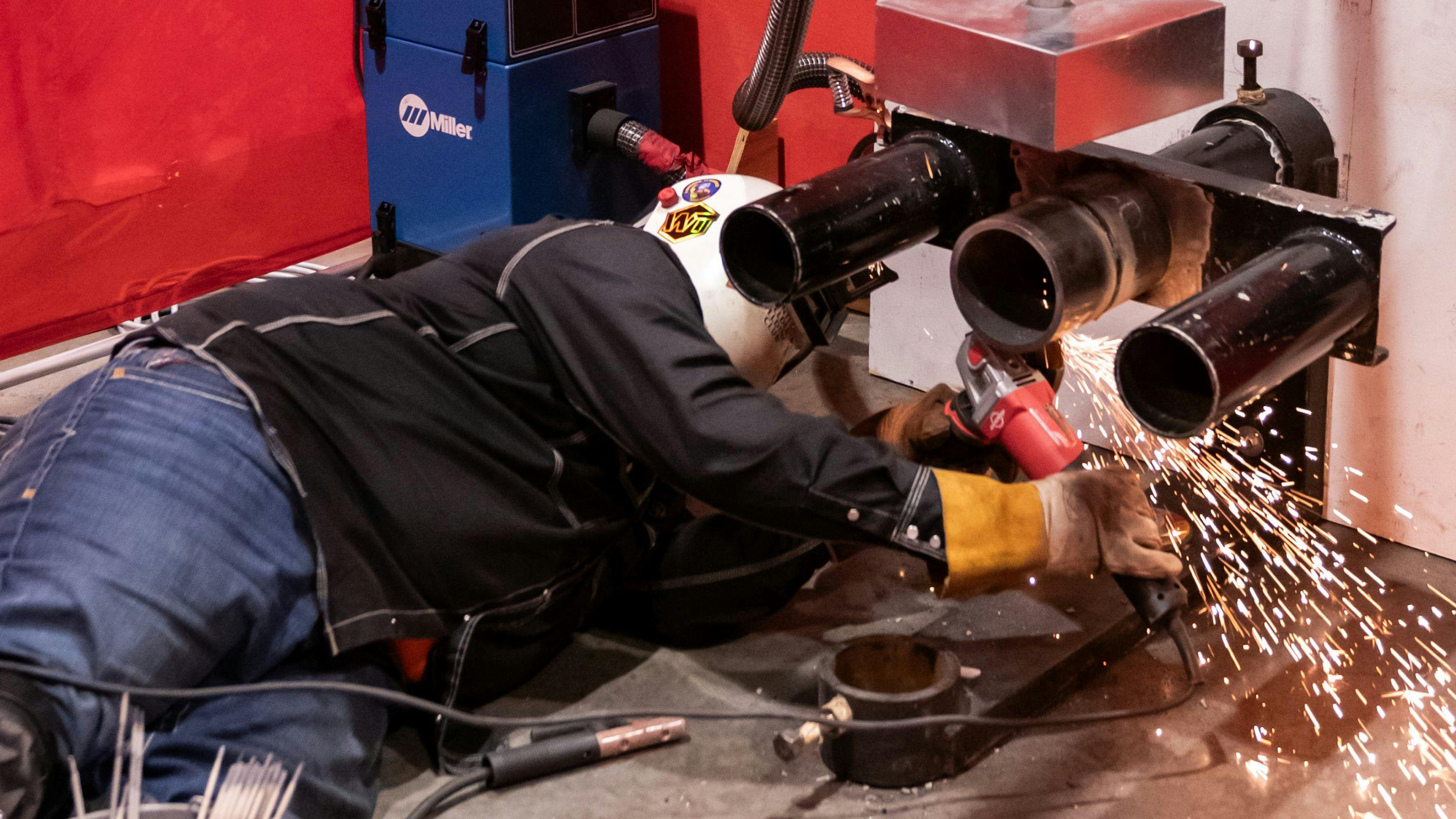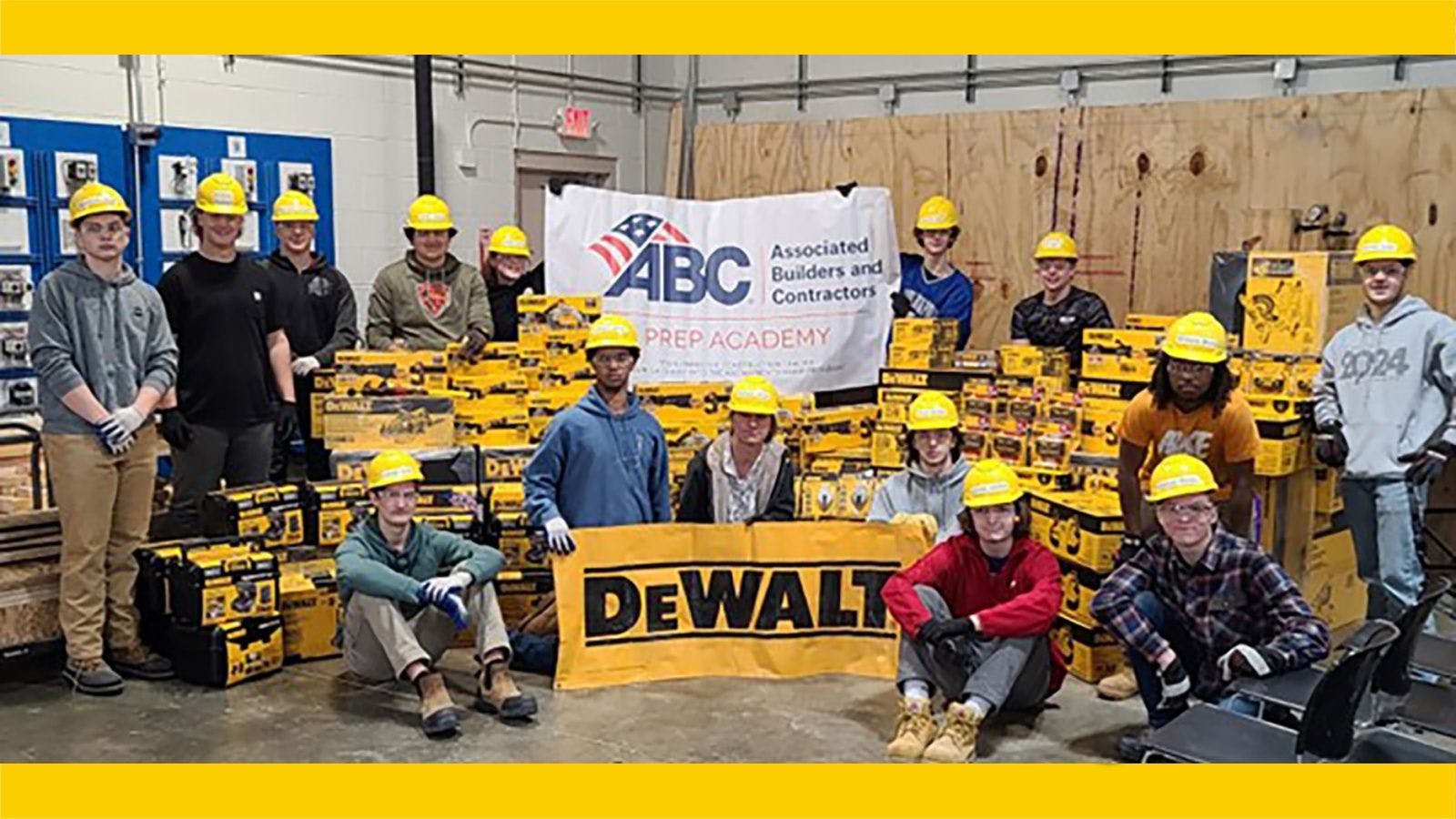
Vision Kwest: Presenting ABC's 2024 Contractor of the Year
Kwest Group was always going to be a success. Ryan Odendahl is sure of that today—but even 20 years ago, it was always the plan.
Odendahl had left a good position with a successful contractor to join his boss in running a new heavy contracting company in northwestern Ohio. He was 30 years old, a former Marine, and used to making a plan, executing on it and achieving commensurate results.
“Our revenue goal this year is $165 million,” Odendahl says. “In 2003, would I have said that? Probably not. But to get here, it’s just been the next step, and the next step, and the next step. So, I would not have said $165 million at the time, but I would’ve said, ‘We’re going to make this something really great,’ because otherwise we wouldn’t have done it.”
Done it they have—crowning two decades of high-performing growth by being named ABC’s 2024 Contractor of the Year at ABC Convention last month. “For little old Kwest Group, in the pool of contractors that is ABC, to get Contractor of the Year is humbling,” Odendahl says. “Like, a pinch-yourself humbling experience. We are really, really proud of the team.”
RECESSION TO THE RESCUE
“Little old Kwest Group” isn’t actually all that little today, but it certainly was when Odendahl and Mark Murray started the business. Both were working at a large, family-owned heavy highway firm in northwestern Ohio—Odendahl as part of the environmental group, Murray as president of the holdings company. When Murray found an opportunity to acquire a small industrial contractor located in Port Clinton, Ohio, he organized a partnership to procure it and asked Odendahl to run the operations side.
As managing partners, the two rebranded the company Kwest Group, named for Murray’s affinity for Key West. Including Odendahl, Murray and Murray’s wife, Kelly, who served as office manager, there were a total of eight employees, all operating out of a double-wide office trailer.
“Then we just started adding some more team members along the way,” Murray says. “I always think back to some of my early mentoring, when they told me, ‘If you surround yourself with good people, they’re going to make your life easy and the company more successful.’ And I have been very blessed to do that.”
From Port Clinton, which sits right on Lake Erie, Kwest pursued a mix of industrial, commercial, marine and residential work. They tended to be modest little jobs—under a million dollars—but the company grew steadily throughout the triangle of northwestern Ohio, from Toledo to Cleveland to Columbus. Kwest wasn’t quite five years old, on a path to becoming a regional player, when the Great Recession arrived, and suddenly there was a lot more competition for those modest little jobs.
“The recession really started hitting Ohio in 2007,” Odendahl says. “Things were slowing down. We were seeing a lot of competition on the work that we were bidding, and the writing was just on the wall that things were going in a bad direction.”
If Kwest was going to survive, staying regional was no longer an option. The company had done some work at Camp Perry, a National Guard training facility on Lake Erie, near Port Clinton, and now used those contacts to bid on military jobs outside Ohio. For the first time, Kwest would be traveling—something not everyone on the team was interested in doing. Odendahl convened everyone in the equipment shop—about 35 people at that point—and made his case.
“We had white plastic tables set in a horseshoe, and all of our guys were sitting at the tables,” Odendahl says. “I put a chair right at the front and kind of put on the Marine-sergeant hat and said, ‘I know that we have people that don’t want to travel. We’re not going to make you travel, but as a company, we need to do this if we’re going to survive. So, we’re going to be looking for people that can volunteer to do this.’”
Kwest had already secured its first out-of-town job: subcontracting on a pavement-rehabilitation project at a defense distribution depot in Texarkana. Odendahl got his volunteers, led by then-superintendent Mike Lutes, who today is a general superintendent with Kwest. Lutes and his team got the work done, and Kwest didn’t just survive but thrived. There were jobs in New Mexico, in California, in dozens of other states, even in Cuba, at Guantanamo Bay Naval Base. In 2011, Kwest relocated to Perrysburg, Ohio, 10 miles south of Toledo, where they renovated a dilapidated turn-of-the-century farmhouse into a modern headquarters.
Today, Odendahl is president and CEO, Murray retired last June but continues to serve as board chair, and Kwest—employee-owned since 2019—maintains regional offices in Dublin, Ohio; Roanoke, Virginia; and Dallas, Texas. With expertise in energy/renewables, petrochemical/industrial, rail and federal/public, the $130-million company is certified to work in 41 states and has a full-time workforce of about 350 people, many of them military veterans like Odendahl.
“It’s still amazing to me,” he says, “the way we stepped up from small, regional projects to building these complex jobs out of town successfully, profitably and safely. That’s really what allowed us to survive and grow.”
MARINE TO MARATHON TO MUCH MORE
Construction Executive visited with Kwest in the middle of January, during a bitter cold snap that even the locals acknowledged was a bit much. Perrysburg sits on the Maumee River, which feeds into Lake Erie just north of Toledo. There’s a lot of wind and, in this exceptionally flat patch of the Midwest, nowhere to hide from it. But Kwest headquarters is all warmth, starting with the gas fireplace simmering just inside the main entrance.
The company handled the farmhouse renovation itself, preserving as much of the building’s original handcrafted detail work as possible, and adding on new wings and corridors as needed. The result is a seamless compound of offices, board rooms and gathering places—including a social hub called “Murray’s Pub”—that’s both relaxed and professional, cozy and corporate.
That’s not a bad description of Odendahl himself. Sitting in his office on the second floor, he has a Marine’s tight haircut and well-honed posture along with the self-effacing friendliness of a guy from Ohio. Kwest’s company culture reflects the same dichotomy—relentlessly competent and sincerely welcoming.
But the Marine part is key. Odendahl’s father had been one, and when Odendahl was finishing high school in 1991, his older brother was on active duty with the Corps in Kuwait as part of Operation Desert Storm. Growing up in Perrysburg, it’s the only thing Odendahl wanted to do. He enlisted right out of high school, and while he never deployed overseas, the eight years he spent with the Marines were foundational, including deployments with the U.S. Border Patrol and a stint with community relations, coordinating the Marines’ presence at weddings and funerals, speaking at high schools and handling other outreach efforts.
“I had a really cool opportunity to do a lot of things that I wouldn’t have otherwise done,” Odendahl says. “You have an opportunity to lead at a pretty high level, at a very young age.”
While he was still in the Marines, he began attending the University of Findlay at night, completing evening and online classes to earn a bachelor’s degree in environmental and hazardous materials management.
He spent his last three years with the Corps stationed in his hometown, serving on the inspector-instructor staff with a Marine Corps Forces Reserve infantry unit based in Perrysburg. When he mustered out in 1999, Odendahl went to work for the safety group at Marathon Petroleum Corporation, but after spending 8 years in the military, the transition to office life proved challenging. “After lunch, about one o’clock every afternoon,” Odendahl says, “that cubicle would start to close in on me.”
Six months later, he was hired by Murray at the family-owned heavy highway firm, and over five years with the company, gradually transitioned from environmental to industrial projects—“working on automotive plants, refineries and those types of things,” Odendahl says. “That was a really good experience. It introduced me to the construction industry.”
AN ENGINEER’S STORY
Odendahl’s soon-to-be partner at Kwest brought his own nontraditional path to construction. Murray attended Ohio State University, where he first majored in architecture before switching paths and graduating with an engineering degree. He held several co-op jobs, including one with the Kroger Company, working as the aide to the plant engineer at a large baked-goods facility in Columbus, and another with the Ohio Department of Natural Resources, which oversees the state’s park systems and waterways. Murray stayed there for 12 years, growing from a design engineer to head of construction.
“It was everything from a state-park lodge to state-park cabins to golf courses, dams, bridges, marinas—just a really diverse background,” Murray says. “For a young guy that was an engineer, I was really lucky to be actively part of such diverse construction. It was very advantageous to me to work for a public entity first—to learn how they were funded, what their priorities were, their contracts, how they designed things and what their expectations and processes were.”
Finding himself drawn to heavy civil work, Murray eventually left ODNR to become vice president of the civil and marine construction group for a company operating in northwest Ohio. He worked on projects for the U.S. Army Corps of Engineers and other “governmental entities” that needed marine or shoreline work. “The company culture wasn’t a great fit for me,” Murray says, “but I learned a lot.”
After just two years, he was recruited to the heavy highway company, setting in motion the series of events that would cross his path with Odendahl’s and lead to the creation of Kwest Group.
NUMBER ONE: TROOP WELFARE
It’s hard not to believe in fate when you talk to Odendahl and Murray about their work building Kwest together, so complementary are their professional experiences, aptitudes and even personalities. Murray is gregarious, with a nose for bidding and financial management—“the front end of the business,” he calls it—while Odendahl, equally warm if more reserved, is locked into logistics and operations.
That was the division of labor that grew Kwest, with Murray and Odendahl equally focused on the importance of people—finding and hiring good ones, giving them every opportunity to flourish and taking care of them in a way that goes beyond paychecks and benefits. “The two objectives of Marine Corps leadership are, number one, mission accomplishment, and number two, troop welfare,” Odendahl says. “We have spun those around. We take care of our troops first; then mission accomplishment takes care of itself. If we have happy employees that are empowered, that know how to do safe, quality work, they’re going to be our best ambassadors with our customers.”
Formally, taking care of the troops means prioritizing safety on every jobsite, providing the best training and professional-development opportunities and offering industry-leading benefits, including a commitment to total human health. Informally but no less tangibly, it means fostering a culture in which everyone looks out for everyone else, from the top down, the bottom up and every which way around. At Kwest, employees know they can stay home if a kid is sick, or leave early to attend someone’s piano recital or baseball game. They donate to fundraisers, send food and check up on anyone who is going through a medical incident. Last summer, when employees in Kentucky were affected by flooding and tornadoes, Kwest dispatched work crews to help them clean up and rebuild their communities.
“The Kwest family is extremely important,” Murray says. “If somebody’s child or somebody’s wife or somebody else in the family is not doing well, we’re going to do everything we can to help them. And that’s not just writing a check.”
BY THE PEOPLE, FOR THE PEOPLE
Everything for Kwest comes back to its people, something Odendahl picked up in the Marines and never put down—in terms of not just how to treat them but what to expect from them. “We’ve always said that our crews are like military fire teams,” Odendahl says. “We’ve given the foremen a lot of responsibility, just like 22-year-old Marines who are responsible for a squad.
“They have a lot of authority to adjust and change,” he continues. “Everyone looks at the military as this autocratic, top-down thing, and it’s not. Those young leaders are empowered to make changes that they need to make, because a lot of times, there’s not a next level of leadership there.”
Indeed, so implicitly does Kwest trust and value its people that, five years ago, it transferred ownership to them. As Murray contemplated his retirement, he and Odendahl considered the options—Odendahl buying out Murray, selling Kwest to a third party, etc.—before settling on an employee stock ownership plan (ESOP), under which a trust owns the company and distributes shares to employees over a set period. Employees are eligible to receive shares once they’ve worked 12 months or one thousand hours in a year for Kwest.
“The ESOP is a way for us to continue the culture of the company and to transition it to the employees, because the employees are the ones that got us where we are,” Odendahl says. Adds Murray: “It created a legacy company for employees that rewarded them for their work.”
GREATER PURPOSE
Kwest’s work at Guantanamo Bay comes up a lot in interviews with its leadership team. Over about three years in the early 2010s, the company completed multiple projects at the military base, starting with the site work and concrete package for a fuel storage tank. Guantanamo’s location on the southeastern end of Cuba imposed a variety of logistical challenges. All equipment and materials for a project were packed into shipping containers, loaded onto a barge in Jacksonville, Florida, and sailed to the base. Work crews spent four-week rotations onsite and came home once a month, with flights on small passenger planes that followed a wide, carefully prescribed path to avoid Cuban air space.
“It was really cool,” Odendahl says. “Kind of crazy, but a great experience.”
Odendahl is also excited about Kwest’s growth into the energy sector, including ongoing partnerships completing large access and substation projects for multiple national electric utility companies. He credits Kwest’s first energy relationship, with Columbus-headquartered American Electric Power, a $94-billion utility that serves 5.6 million customers across 11 states, with opening his eyes to the sector’s possibilities. “When we started working with them, that really accelerated our development,” Odendahl says. “They challenge us to be the safest contractor in the industry, and as a result, we are a better contractor every day. Our work to pursue zero harm in all our activities provides for a constant journey to protect our team and the public.”
What’s next? Kwest is planning for future growth—but, predictably, Odendahl ties that back to his people.
“We’re eyeing additional geographic expansion, to provide more opportunities for our folks and to find more markets for our teams,” he says. “We’re looking at the next level of leadership and developing the folks that are coming up within the company right now.” The company has started a leadership acceleration program, with four or five employees a year from a cross-section of departments working with an outside leadership consultant—“empowering them and educating them for the next level of leadership.”
Odendahl and his wife, Andrea, have two sons—one of them following in his father’s and grandfather’s bootsteps as a Marine, currently deployed overseas as an engineer. Andrea is an environmental consultant who worked for the Ohio Environmental Protection Agency for 15 years while also being “a sounding board for everything” that has gone into starting and growing Kwest, according to Odendahl. Andrea describes herself, with a laugh, as “the first lady of Kwest,” adding: “I am happy do whatever is needed, whether that be environmental support or anything else.”
It all adds yet another dimension to the Kwest family, which is never far from Odendahl’s mind. “When we talk about things in the company—an employee issue or a proposal for something—I think all the time about, if it was one of my boys, what would I want the decision to be?” he says. “We all talk openly about that: If this was one of our kids, how would we want this to be done?
“Andrea and I do believe that we are here in this company because it’s where we’re supposed to be, to help change people’s lives. That is the most important thing that we do.”
Chris leads Construction Executive’s day-to-day operations—overseeing all print and digital content, design and production efforts, and working with the editorial team to tell the many stories of America’s builders and contractors. An experienced association magazine editor, writer and publications strategist, he is a graduate of Saint Joseph’s University and lives in Arlington, Virginia.
Related stories








